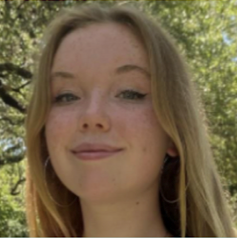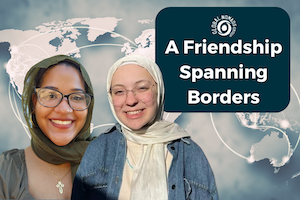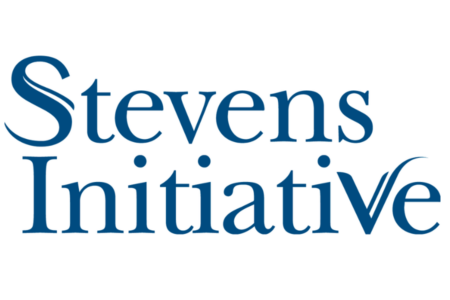
Hailing from San Antonio, Texas, Quincy, 17, hadn’t had many opportunities to make international friends. Global Nomads changed that.
Quincy had joined the very first Content Creation Lab cohort. This experimental internship program was developed during the early pandemic to empower youths to create educational content for Global Nomads programs. Quincy was assigned to the women’s rights team.
Her team of seven consisted of students from all around the globe, including Turkey, Ecuador, and South Africa. She worked closely with a partner from Turkey to produce videos related to their topic. “She and I would meet every week together just by ourselves,” Quincy says, “we grew pretty close.”
What struck Quincy most was how much her peers in other countries had in common. “We were all a lot more similar than I thought. We liked a lot of the same things. We were on the same social media and we had all heard of the same pop culture references.” They even bonded over the COVID protocols at their schools.
“It was really fun to talk to them about their lives,” she says. “We all still keep in contact today. We all follow each other on Instagram and SnapChat.”
Though they had much in common, they all brought unique perspectives to the topic at hand: women’s rights. From fair access to healthcare, jobs, personal safety, and more, she discovered many aspects of women’s rights that she hadn’t considered when placed in a different cultural context. “Everyone can share what they want to share and then you work on it together to make it something that is used in Global Nomads programming” she says.
The experience informed her both about the topic abroad, but also at home in the US.
Women’s rights is a favorite subject for Quincy. Prior to COVID she participated in a San Antonio-based seminar where students research and present on empowerment of women and the responsibilities of being a global citizen. She also dedicated her high school junior research project to topics like Roe v. Wade and the Texas Heartbeat Bill.
This passion will extend well past high school and college. “I am really interested in social activism and these programs have prepared me for that,” she says. “So I want to do something with law and rights advocacy after college.”
Her education didn’t stop with the content of the course. The Content Creation Lab is, after all, a paid internship and requires developing many different skills.
“I’d never done any kind of work experience like that before,” Quincy says. “With this program, you have to do your assignments on time, but you also have to meet in meetings and develop ideas on the spot. Global Nomads not only gave me the confidence to do that, but prepared me to teach others how to do that as well.”
Quincy is currently finishing up her second cohort with the Content Creation Lab, this time leading a team developing materials on careers in finance. She and a partner are teaching her peers backwards mapping – a best practice in curriculum design – and facilitating the team’s development of the learning experiences and content. “I help my team develop ideas for writing and research, video production and social media. Then we give them feedback and we offer support with any difficulties.”
With schools reopened and extracurricular activities like sports returning, Quincy says it’s difficult to find the time to do everything she wants to. But she hopes to continue with the Global Nomads Programs throughout the rest of high school. She believes the time management skills she learned from her two cohorts will help her with college and her future career.
One plan remains concrete: study abroad. With all of the friends she met through Global Nomads, Quincy is inspired to attend college in another country. Her dream is France, where she hopes she can improve her French language skills and make new friends abroad.
Quincy Bartlett is a senior in high school in San Antonio, Texas. Along with Global Nomads programs, she has worked Students Rebuild and Women’s Global Connection to further her knowledge about women’s and human rights issues.



